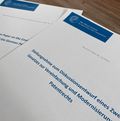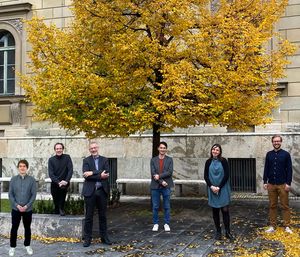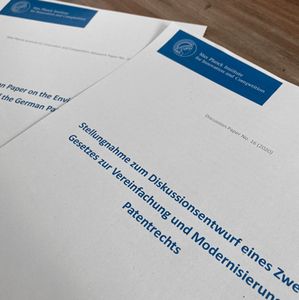Covid-19 and the Role of Intellectual Property
Position Statement of the Max Planck Institute for Innovation and Competition of 7 May 2021

Signing the Position Statement
If you want to sign the position statement as a supporter, please send us your name, title, affiliation and position to covid(at)ip.mpg.de or you can use the following form.
With your support you agree to the publication of your information (with the exception of your email address) on our website. You can withdraw your consent at any time.

Covid-19 and Intellectual Property: 10 Arguments Against a Waiver of Intellectual Property Rights
Are patents hindering the global availability of vaccines against Covid‑19? In a ten-point Position Statement a Research Group of the Institute shows why a suspension of intellectual property rights would neither foster vaccine production nor lead to a more equitable distribution of vaccines.
Nearly half a year after the first Covid‑19 vaccines became available on the market, they remain in short supply. In October 2020, India and South Africa submitted a proposal to the World Trade Organization (WTO) to temporarily waive intellectual property rights related to the prevention, containment or treatment of Covid‑19 during the pandemic. The application proposes that the waiver should continue until the majority of the world’s population has been immunized against the virus. A decision in the WTO Council would have to be unanimous. In the meantime, the US has announced its support for the initiative; nevertheless, there are also powerful dissenting voices.
With their proposal, India and South Africa are undoubtedly pursuing objectives that deserve support as such. An effective response to the pandemic indeed requires “rapid access to affordable medical products” and global cooperation. Yet a waiver of all intellectual property rights regulated within the framework of the TRIPS Agreement is unlikely to be a necessary or a suitable measure towards the pursued objectives.
“Requiring patents on Covid‑19 vaccines to be suspended would not only fail to provide relief from the current vaccine shortage, it would even be a highly dangerous experiment”, says Reto M. Hilty, Director of the Institute and Lead of a Research Group that has examined among other things how intellectual property rights affect the production and distribution of vaccines and medicines against Covid‑19 and what impact these rights can have on their prices.
In a Position Statement, the group summarized ten arguments why intellectual property rights so far have played an enabling rather than hindering role in overcoming the pandemic and why the international community will not benefit from a waiver either during or after the pandemic.
The full text of the Position Statement is available here.
A brief summary of the arguments can be found here.
A YouTube video of the discussion “Vaccine for all! What can be done?”, which took place on July 1 for the Max Planck Forum with the participation of Reto M. Hilty, can be found here (in German).
Artificial Intelligence and Intellectual Property Law
Position Statement of the Max Planck Institute for Innovation and Competition of 9 April 2021 on the Current Debate
View the statement (pdf)
Position Paper on the Draft of a Second Open Data Act and a Data Usage Act (DNG)
The position paper of Heiko Richter welcomes the high ambitions of the legislative proposal, but criticizes its failure to completely fulfill them, as the draft hardly goes beyond the requirements of EU Directive 2019/1024, and Section 12a of the E-Government Act falls short of its potential. In addition, the position paper also makes specific suggestions for improvement for the further legislative process.
Position Paper on the Draft Bill for an Act to Strengthen Consumer Protection
The position paper relates to the changes to German unfair competition law (UWG) resulting from Directive 2019/2161/EU. Although they undermine the approach of the UWG (claim for damages of the individual consumer), the 1:1 implementation of the draft bill is to be approved - after an influence in advance was obviously impossible. It is suggested, however, that the Directive's opening clauses should be used more extensively and that guidelines not conditioned by them, such as influencer marketing, should be waived.
Position Paper on the Draft Bill for a Copyright Service Provider Act
In a position paper on the draft bill for an "Act to adapt copyright law to the requirements of the digital single market", the Institute provides suggestions in particular for the design of the planned Copyright Service Provider Act (UrhDaG).

Position Paper on the Copyright Law Reform: Liability for Online Service Providers
The Federal Ministry of Justice and Consumer Protection has presented a draft bill for the implementation of the new Directive on Copyright in the Digital Single Market into national law. In a position paper, the Institute provides suggestions for the design of the planned Copyright Service Provider Act.
The controversial Directive 2019/790 on Copyright and Related Rights in the Digital Single Market caused severe protests prior to its adoption, particularly in Germany. It was, above all, today’s Article 17 on the responsibility of online content-sharing service providers that was harshly criticized. In the context of the vote by the EU Council on April 15, 2019, the German government felt compelled to issue a protocol declaration according to which the controversial upload filters should be largely dispensed within the national implementation of the Directive.
The Member States must now transpose this EU Directive into national law by June 7, 2021. In October 2020, the Federal Ministry of Justice and Consumer Protection (BMJV) presented a draft bill for an "Act to adapt copyright law to the requirements of the digital single market", which has not yet been coordinated with other ministries. Above all, it was eagerly awaited how the Federal Government's protocol declaration can be actually implemented.
The copyright responsibility of online content-sharing service providers in Germany is to be regulated in future by an independent act, the Copyright Service Provider Act (UrhDaG). According to this, online content-sharing service providers are - as required by the Directive - generally responsible for the content uploaded by their users. However, they can exempt themselves from their liability by complying with specifically stipulated duties of care. The UrhDaG is intended to specify what these obligations are.
New act regulates copyright responsibility
The Max Planck Institute for Innovation and Competition accompanied the adaptation of copyright law to the requirements of the digital age already with regard to the EU Directive. A project group commented in great detail on the drafts of the EU Commission. The Institute now also issued a position paper on the current draft bill. The focus of this paper lies on the UrhDaG.
In principle, the six-person project group welcomes the establishment of the UrhDaG. The draft adopted "with innovative proposals a path that is fundamentally suitable for achieving the necessary balance of copyright interests in the distribution of copyright content via online platforms," the position paper states. On some points, however, the authors provide suggestions for the further legislative process, especially with regard to the planned licensing mechanism (Sec. 4 UrhDaG), the obligation to pay remuneration for legally permitted uses (Sec. 5 UrhDaG) and the consideration of minor uses (Sec. 6 UrhDaG).
Overview of the suggestions in the position paper
According to the project group, Section 4 UrhDaG is likely to have a positive effect on the licensing market as it creates a regulation that sensibly shapes the requirements for action of online content-sharing service providers and rights holders in the licensing process. However, the position paper suggests some improvements and specifications in order to avoid legal uncertainties in the case of licensing through individual rights holders.
The project group welcomes the fact that in Section 5 UrhDaG the draft bill clarifies the applicability of the copyright limitations for the regulatory area of the UrhDaG in order to capture as many forms of "user generated content" as possible and make them legally accessible online. It expresses criticism, however, that online content-sharing service providers should be subject to an obligation to pay remuneration exclusively for the use of works for the purpose of a pastiche (Sec. 7(2) UrhDaG). "In view of the functional logic of the UrhDaG and the special interests of online content-sharing service providers, rights holders and users, as well as expected problems of demarcation, all uses pursuant to Section 5 UrhDaG should be remunerated by the online content-sharing service providers," the position paper states.
The planned facilitation of minor uses according to Section 6 UrhDaG is also appreciated by the position paper in principle. However, since there are doubts regarding the conformity of the concrete design with EU law, it is suggested that the objective should be implemented by means of a different legislative solution. The project group makes specific proposals for this.
Read the full text of the Institute's position paper (in German) here
The e-book "Modernisation of the EU Copyright Rules", edited by Reto M. Hilty and Valentina Mocson, can be found here

Position Paper on the Proposed Reform of the German Patent Act
The Position Paper generally welcomes the initiative of the Federal Ministry of Justice and Consumer Protection, but makes suggestions for improvements, in particular, with regard to the application of the principle of proportionality in the injunction relief proceedings and the protection of trade secrets in patent litigation.
Comments on the Draft Issues Paper of the WIPO on Intellectual Property Policy and Artificial Intelligence of 11 February 2020
Position Paper on the government draft of 23 January 2019 for a Thuringian Transparency Act
A legal analysis of the proposed enactment of a Transparency Act in Thuringia.


